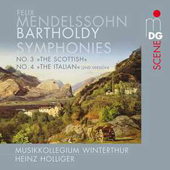
ESSENTIAL RECORDINGS

My appreciation for the symphonic works of Felix Mendelssohn (1809-1847) has increased tenfold since this new recording by MDG
landed in my CD player. Up until now I've always wondered as to where Mendelssohn fit within the stylistic and chronological development of music. Other uninspired
interpretations would relegate him to the Classical period by stressing the pedantic and finicky aspects in his writing, while others made him sound like a precocious
Romantic who lacked the skills to really make it work. This inspired look by conductor Heinz Holliger fits him right in his place within the jigsaw puzzle
of music history. Mendelssohn forms the perfect link between Beethoven and Brahms. He wanted to embrace the new Romantic ideals but could not bear to be unfaithful
to the refined taste and intellect of Classicism. A paradox I'm sure that must have hindered his free development.
The Symphony No. 3 in A minor, Op. 56 "The Scottish" and the Symphony No. 4 in A major, Op. 90 "The Italian"
(1834 version), are strongly modelled on the guidelines set down by Beethoven but also point towards the more openly lyrical aspects of Brahms. The Menuetto
from No. 4 is a prime example of those two worlds colliding.
Composer, oboist and conductor Heinz Holliger's spritely and fresh outlook combined with the fleet-footed and finely detailed account by the
Musikkollegium Winterthur, an orchestra that doesn't act its age (almost 400 years), makes for an invigorating listening experience. The tempos are swift and tight,
the rhythmic pulse is always free and flowing, and the orchestral textures are crisp and finely balanced. Holliger himself states that "Mendelssohn requires a great measure
of virtuosity and a light, transparent sound. His music tolerates neither maudlin sentimentality nor bombast." This pristine sound recording by MDG
clearly demonstrates that this conductor acts on his words.
Jean-Yves Duperron - September 2011